Eldonna Edwards's Blog, page 2
January 3, 2019
Out On A Limb: World-Building From The Ground Up
 Sanya Nanshan Treehouse Resort | Shi Huai XunWhen I was a young girl I envied our neighbor's adorable playhouse, a miniature home with tiny windows and a real roof, set back among the trees in their back yard. The little house had long been abandoned by their grown daughter but my sisters and I were not allowed to trespass on their fenced property. That didn't keep me from admiring the secret hideaway from our side of the barrier, which seemed more like a wall than a fence when you're a small child.
Sanya Nanshan Treehouse Resort | Shi Huai XunWhen I was a young girl I envied our neighbor's adorable playhouse, a miniature home with tiny windows and a real roof, set back among the trees in their back yard. The little house had long been abandoned by their grown daughter but my sisters and I were not allowed to trespass on their fenced property. That didn't keep me from admiring the secret hideaway from our side of the barrier, which seemed more like a wall than a fence when you're a small child. What I remember most about the playhouse is the ache of jealousy I felt. I've always been a fan of cozy places. I used to love building forts under sheets draped over tables and sofas or between bales of hay in my friend Paula's old barn. I often hid in the linen closet on the second floor of our five-bedroom parsonage where I crawled between the shelves and wrote secret messages with glow-in-the-dark Play-Doh on the board above my head. One of my other favorite places was the small space between the washer and dryer where I would drag a blanket and let the warm rumbling and churning lull me to sleep. I also loved to hide in closets, a habit that helped inform young Grace Carter's visits with her deceased twin in my debut novel about a clairvoyant preacher's daughter, THIS I KNOW.
Fast forward to my teens when my dear dad gifted us with the best thing ever, an A-frame tree house nestled into a huge tree on the east side of our new house. At first it was a novelty to my younger sister and little brother, aged eight and twelve, but they quickly bored of it. Not me. I practically moved in, covering the walls with square carpet samples donated by Burcon's Furniture Store, coincidentally owned by the same family who'd lived beyond The Great Wall of our earlier home, the one with the forbidden playhouse and teenagers frolicking in an in-ground swimming pool, also off limits to my siblings and me. At age fourteen I carried my guitar up the rickety ladder of the tree house and sang Joni Mitchell songs and wrote a few aching love songs of my own. Mostly I sat with my legs dangling off the edge of the plywood floor, scribbling bad poetry, my fort swaying as the branch yielded to moody Michigan winds.
Given my love for trees and hiding places, it likely comes as no surprise that as a volunteer
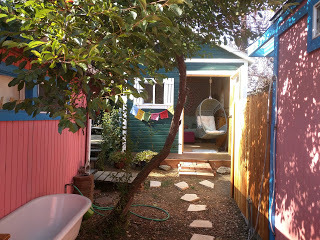 My Backyard Writing Shedscreener with our local film festival, I fell in love with a 2009 documentary about a group of free-spirited young people who formed a coalition of independent island-dwellers on the north beach of Kauai. I've long been fascinated by the revolutionary 1960s, the communes, the sloughing off of traditional family structures in favor of tribal life. I've fantasized about living in an intentional community.
My Backyard Writing Shedscreener with our local film festival, I fell in love with a 2009 documentary about a group of free-spirited young people who formed a coalition of independent island-dwellers on the north beach of Kauai. I've long been fascinated by the revolutionary 1960s, the communes, the sloughing off of traditional family structures in favor of tribal life. I've fantasized about living in an intentional community. At one point I turned my empty-nest home into a sort of boarding house and filled the rooms with young women who needed a safe place to live. My "girls" christened our house The Urban Oasis. They've long-since moved on, some now with families of their own, but those young women will always be remembered as part of my evolving tribe. I now live in a tiny converted garage next door to that house, what we call a granny unit here in California. I recently built myself a "playhouse," that serves as my writing studio under a Yucca tree in the back yard. Okay yes, it's my grown-up fort. It even has a hanging swing chair.
It's been almost a decade since I first began to conjure a story that incorporates my love of cozy places with my curiosity toward communal living. In about twenty weeks that story will hit bookstore shelves. In CLOVER BLUE, the members of Saffron Freedom Community reside among ancient live oak trees, the largest of which supports their many-roomed tree house. They live free from the weight of cultural norms. Free of clothing, if they wish. Free from overcrowded classrooms. Free to raise their own food and treat illness with herbal remedies rather than Western medicine. But as in all civilizations, freedom requires self-regulation, lest people begin to treat their claimed liberation from society's rules as a sense of entitlement. This concept is the moral challenge I sought to pursue through the eyes of a young boy who grows up dedicated to the precepts of his idyllic community and the tribe he loves. That is until he begins to question everything he's ever learned in his quest for truth, beginning the day the family midwife is preparing for a communal birth.
I want to be excited, but I'm a little freaked out. I'm worried Jade's baby might not survive, just like the baby goat that got sick and died. Goji forbids doctors and hospitals. We believe in natural medicines. Sirona probably knows what she's doing, but what if she doesn't? What if none of them know what they're doing? --Clover Blue, age 10
I'm counting down the days (145!) until y'all get introduced to young Clover Blue, his best friend Harmony, and the rest of this ragtag clan of tree house dwellers. In the meantime, tell me about your favorite hiding places, your dream oasis, your sacred spaces. Where do/did you go when you need(ed) a quiet place to dream?
Book Trailer for CLOVER BLUE by Eldonna Edwards
I'll leave you with this delightful Shel Silverstein poem from his book, Where The Sidewalk Ends.
A tree house, a free house,A secret you and me house,A high up in the leafy branchesCozy as can be house.A street house, a neat house,Be sure to wipe your feet houseIs not my kind of house at all- Let's go live in a tree house.
Published on January 03, 2019 08:25
December 21, 2018
Hippies and Gurus and Communes, Oh My!
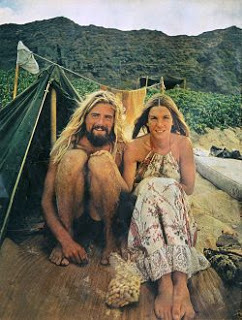 Back then it was just the six of us: Goji, Willow, Wave, Jade, Doobie,and me. I don’t remember much from the first couple years after I came here, but sometime during that summer my memories kick in, as if my brain suddenly threw the switch that saves stuff. --Clover Blue
Back then it was just the six of us: Goji, Willow, Wave, Jade, Doobie,and me. I don’t remember much from the first couple years after I came here, but sometime during that summer my memories kick in, as if my brain suddenly threw the switch that saves stuff. --Clover BlueWhen I was a girl I envied my sisters for each having a unique nickname, endearingly handed out by my dad. My oldest sibling Sharon was called Queenie due to her towering height. Luanne was LuLu, Mari-Beth was Izzy, Nita was Neat (although she spelled it "Nete") and LaVonne was Ree, short for her middle name, Marie. My baby brother David we called Gus, or more commonly, Gassy Gus, for obvious reasons. Me? I was simply Donna, although my sisters recently informed me that my nickname was actually Pinch-Face so maybe I just blocked the memory.
One of the most thrilling parts of starting a new novel is getting to name your "children". CLOVER BLUE is set in a 1960s/70s Northern California spiritual commune led by a quiet but charismatic man who gathers like-minded people to live a life that he terms The Peaceful Way. Each member of Saffron Freedom Community chooses or is given a new name when they join the family. As someone who lives in California and with a twenty-five-year career in massage therapy, I'm pretty sure I've heard every hippie-dippy-woo-woo-hooky-do name out there so I assumed this task would be easy.
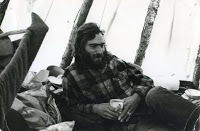 Long before typing the first words of the book, I made a list of my characters and their qualities, then assigned them a unique name. Besides Clover Blue and his best friend Harmony, whose namings are revealed as the story unfolds, Jao Ji was the first name that came to me for the group's founder, given to him by an Indian guru. I wanted the leader's title to be a bit of a puzzle, just as he is. I liked the sound of the word. In Hindi Jao means "go" and Ji is a suffix of respect. So to my mind, having traveled throughout Eastern Asia before starting the commune, it felt like a fitting name for him.
Long before typing the first words of the book, I made a list of my characters and their qualities, then assigned them a unique name. Besides Clover Blue and his best friend Harmony, whose namings are revealed as the story unfolds, Jao Ji was the first name that came to me for the group's founder, given to him by an Indian guru. I wanted the leader's title to be a bit of a puzzle, just as he is. I liked the sound of the word. In Hindi Jao means "go" and Ji is a suffix of respect. So to my mind, having traveled throughout Eastern Asia before starting the commune, it felt like a fitting name for him. 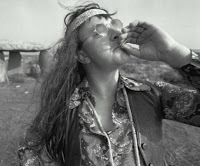 The next two names were given to prominent characters Willow and Wave, who, despite the free love enjoyed during the sexual revolution, remain steadfast in their love for each other. Willow is a skilled yogi and Wave a former surfer who abandoned the sea after an encounter with a shark. Another original member, Doobie gets his moniker from not only being the family marijuana cultivator, but also the person who consumes most of the product. It's a friendly name, which reflects Doobie's easy-going personality.
The next two names were given to prominent characters Willow and Wave, who, despite the free love enjoyed during the sexual revolution, remain steadfast in their love for each other. Willow is a skilled yogi and Wave a former surfer who abandoned the sea after an encounter with a shark. Another original member, Doobie gets his moniker from not only being the family marijuana cultivator, but also the person who consumes most of the product. It's a friendly name, which reflects Doobie's easy-going personality. On and on my list went with names like Lyric, Tao, Peace, Feather and Earth, a singer-songwriter, a thespian, a war protester, a bee-keeper and a wildish woman who worships nature. There were other characters on the list, minor characters, and together I created a lively cast of spiritual seekers devoted to living a peaceful life in nature, far from the madding crowd. But as the story unfolded on the pages and these people came into better focus, they evolved from simple characters to three-dimensional human beings with a past and a purpose. Some wore their names perfectly while others began to slough off the names I'd given them, begging for a more suitable one.
Jao Ji became Goji, a bastardization of what his teacher had called him, underscoring his flawed self-
 image. Rather than "Respected Traveler" his name became simply a plant with berries. Peace was renamed Coyote when he evolved from being just an army deserter to a man whose integrity runs much deeper than his politics. Earth became Gaia as she grew into her unpredictable wildness. I changed Feather to Jade because she is a much stronger, more independent woman than I'd first imagined. And sadly, Lyric and Tao disappeared from the pages as I tightened the cast and killed off my darlings.
image. Rather than "Respected Traveler" his name became simply a plant with berries. Peace was renamed Coyote when he evolved from being just an army deserter to a man whose integrity runs much deeper than his politics. Earth became Gaia as she grew into her unpredictable wildness. I changed Feather to Jade because she is a much stronger, more independent woman than I'd first imagined. And sadly, Lyric and Tao disappeared from the pages as I tightened the cast and killed off my darlings.What I realized while writing Clover Blue is that it would have been easy to take the lazy route and write caricatured versions of every hippie or flower child I've ever met, read about or seen on the screen. But the characters in CLOVER BLUE are more than their names. They are part of a collective tribe yet each with distinct passions and motivations, just like you and me. Mine just happens to be conjuring worlds full of imagined people and places to entertain and hopefully, enlighten readers. I sincerely hope you enjoy the time you spend with them as much as I did creating them.
CLOVER BLUE is now available for Pre-Order!
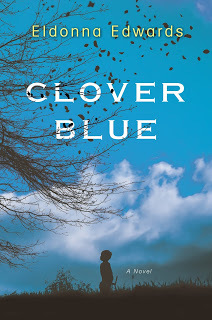
Published on December 21, 2018 13:34
December 12, 2018
When Breath Becomes Heir
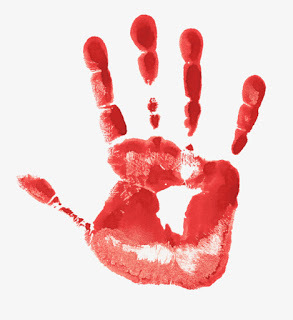 *Note: Beginning last week with the Cover Reveal for my next book, CLOVER BLUE, I'll be posting weekly-ish peeks into the story ahead of release on May 28, 2019. Be sure to subscribe via the button on the left to stay updated!
*Note: Beginning last week with the Cover Reveal for my next book, CLOVER BLUE, I'll be posting weekly-ish peeks into the story ahead of release on May 28, 2019. Be sure to subscribe via the button on the left to stay updated! When I was about seven years old, I sat at my desk in our tiny elementary school, staring at the pencil between my fingers, turning my hand this way and that. I remember very distinctly a dawning awareness of my hand attached to my arm, my breaths leaving my mouth, my body separate from my thoughts. In that brief existential moment, I suddenly understood that what I was, was not who I was.
It was a strange feeling, this new realization that my body would grow and change but that the person inside having those thoughts would remain. The experience, however brief, left an indelible mark on my memory. At fifty-nine years old I still remember that epiphany almost as clearly as if it happened yesterday.
As children we accept what we're told and rarely question the past as it fades in the wake of our maturation. And yet for most of us, there comes a point where we begin to ponder our existence, how we fit into the world, our families and the surrounding environment. We yearn to identify as a member of the human tribe that begins with our parents and siblings, stretching outward toward extended family, friends, and community. The older we get, the more our world expands to include our country, our planet, and the seemingly-infinite universe.
In my next novel, Clover Blue, my young protagonist is missing a piece of his biological puzzle. He lives in a spiritual commune in Northern California without running water or electricity. Each day begins with yoga and ends with meditation. They sleep in an elaborate treehouse, raise their own food, and the Youngers are nature-schooled. Clover Blue is twelve years old when he begins to reflect upon his connections beyond Saffron Freedom Community:
I have no memory of anything before here. Sometimes when we’re in town at the library or the store, I hear a voice and it sounds familiar. Once in a while a smell reaches into my brain and tries to call up the past, but it’s always dark and flat. Maybe I don’t want to remember. Maybe it was bad. Or maybe it was so good it would hurt too much to remember.
And so begins Blue's search for identity among the ragtag tribe of folks who've raised
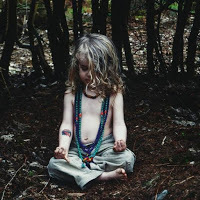 him. People like Goji, the commune founder, Jade, their former beekeeper, Wave, a guitar-playing surfer and his "old lady" Willow, a yoga enthusiast. Although Blue loves his unique family--especially his funny and fiercely independent best friend, Harmony--he aches to know more about his roots and how he ended up at Saffron Freedom Community.
him. People like Goji, the commune founder, Jade, their former beekeeper, Wave, a guitar-playing surfer and his "old lady" Willow, a yoga enthusiast. Although Blue loves his unique family--especially his funny and fiercely independent best friend, Harmony--he aches to know more about his roots and how he ended up at Saffron Freedom Community. What about you? Can you remember when you first began to assert your autonomy as an individual? Was it a lightning bolt revelation or was it a more gradual understanding of your place in the world?
***********Have I piqued your interest yet? I hope you'll follow this blog to learn more about my earnest young protagonist and his ragtag tribe. If you add Clover Blue to your Goodreads shelf and your BookBub wish-list you'll be notified of any news like giveaways or deals. The book is also available for pre-order online. Descriptions of all my books, including my debut novel This I Know and my memoir Lost In Transplantation can be found HERE.

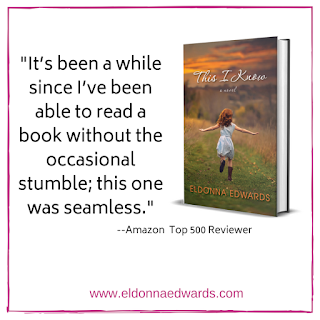
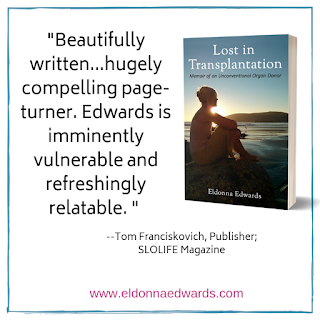
Published on December 12, 2018 13:11
December 6, 2018
Birth of A Book (And A Cover Reveal!)
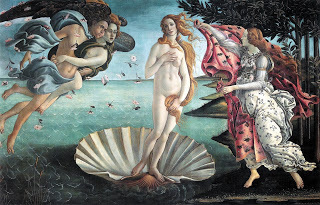 Birth of Venus by Sandro BotticelliAs I read excerpts from my novels while leading a recent writing workshop at our local library, it occurred to me that although not intentional, both This I Know and my 2019 release, Clover Blue begin with a birth. The prologue of This I Know features twins Grace and Isaac communicating their last thoughts to each other during the final moments before birth:
Birth of Venus by Sandro BotticelliAs I read excerpts from my novels while leading a recent writing workshop at our local library, it occurred to me that although not intentional, both This I Know and my 2019 release, Clover Blue begin with a birth. The prologue of This I Know features twins Grace and Isaac communicating their last thoughts to each other during the final moments before birth:I'm spooning my Other, my belly to his back. I love the way his body feels against mine. Although we've changed positions many times, we always come back to this...
My goal was to capture the sibling's love for each other, but also their fear of separation. I'm not a twin and of course I don't remember being in the womb, but I do know how it feels to love. And I have endured the depth and weight of loss many times over so it wasn't that difficult to imagine how vulnerable these two tiny humans might feel as they leave the safety of their mother's womb to face the unknown reality of the outer world.
Authors often compare writing a book to pregnancy, and the eventual release, to birth. It's true that incubating a story takes months, often years, and there's no greater feeling than seeing your book come to life on bookstore shelves and in the hands of readers. Writing, editing, rewriting and revising is hard labor, but the rewards are plenty. One of those rewards is seeing your book cover for the very first time. I remember literally squealing when I first received the cover comps for This I Know. As some of you might remember, the real-life mother of that gorgeous red-headed child on the cover found me on Facebook and shared more photos of her daughter to use in our book trailer.
My next book won't be out for another 175 days (whose counting, right?) but this is the week I get to reveal the cover. Before I do, I'd like to share the opening sentences to give you a feel for the book:
The Olders are letting us watch the birth. Harmony runs up the path ahead of me, her bare feet kicking up a cloud of dust. When she gets to the teepee she turns and yells, "Come on Blue! Aren't you excited?"
This story takes place in a fictional Northern California commune during the 1960s and 70s. The novel opens with young Clover Blue on his way to a birth, attended by the Saffron Freedom Community midwife. His fiercely independent best friend Harmony can't wait for the event but Blue holds back, fearful. And with good reason:
I walk slowly, taking small steps. I might be old enough at ten, but that doesn't mean I'm ready for this. I can't shake the memory of when our nanny goat, Inga, had a baby a couple years ago. She ate the sac around her kid and other stuff that came out of her afterward. I hope we don't have to eat anything that comes out after Jade's baby is born. We're vegetarian so probably not. But you never know with this family.
I loved writing Clover Blue. It was a unique opportunity to imagine coming of age in a spiritual commune among a tribe of bohemian seekers that includes a beekeeper, an army deserter, a surfer, a yoga enthusiast, a pot farmer, and their guru, among others. What would it be like to sleep in an elaborate tree house? To live in harmony with nature, without electricity or running water? To start each day with yoga and end it with meditation? To be raised equally by all the members, not knowing who your biological parents are?
Starting this week I hope to post weekly sneak peeks of passages from Clover Blue. I read the first several pages in a Live Video on my Facebook page yesterday (reading starts at 10:30) if you'd like to listen. I hope you'll follow this blog to learn more about my earnest young protagonist and his caretakers. If you add Clover Blue to your Goodreads shelf and your BookBub wish-list you'll be notified of any news like giveaways or deals. The book is also available for pre-order online. And now...drum roll please...I present the amazing cover for CLOVER BLUE. I look forward to reading your comments!
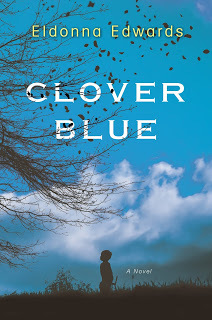
Published on December 06, 2018 07:23
November 10, 2018
Drawn to The Fire: How Tragedy Brings Us Together
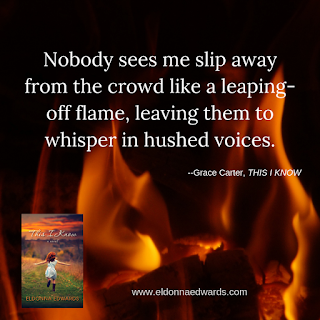 California is burning. I'm fortunate not to be in close proximity to any of the currently active wildfires, but my son lives just four miles from the Camp Fire in Northern California. Jacob and I communicated by text throughout Thursday night as the fire consumed over 6,400 homes, 230 businesses, and innumerable creatures in its path. His neighborhood was supposedly still safe, but what if the winds shifted? Should he wait or evacuate with a few possessions and his cats? Would he lose the job he'd just started, located a stone's throw from the fire line?
California is burning. I'm fortunate not to be in close proximity to any of the currently active wildfires, but my son lives just four miles from the Camp Fire in Northern California. Jacob and I communicated by text throughout Thursday night as the fire consumed over 6,400 homes, 230 businesses, and innumerable creatures in its path. His neighborhood was supposedly still safe, but what if the winds shifted? Should he wait or evacuate with a few possessions and his cats? Would he lose the job he'd just started, located a stone's throw from the fire line?In the end my son decided to stay put, although he packed up his car with life-saving necessities, staged valuables near the door, and made sure his gas tank was full and devices charged. While we waited for any new alerts or fire updates, videos of terrified families began popping up on social media. Cars driving through flames, people abandoning their vehicles to flee on foot, the sounds of exploding propane tanks punctuating the terror. By midway through the next day we learned of several residents who didn't get out in time, of injured firefighters, and of overflowing shelters. The #CampFire has already exploded to over 100,000 acres, the largest and most devastating fire loss in California wildfire history. As I write this on Saturday morning, it's just 20% contained. The air quality across the state is equal to Beijing's. And more fires have started.
When I was a young mother, my car and U-Haul caught on fire while driving with everything we owned from Houston, Texas to Tuscon, Arizona. All my photos and journals, my beloved 12-string guitar, and all our clothing went up in flames. I stood at the side of the road holding my one-year-old baby, watching the black smoke engulf the car. I marveled at how fast the fire grew and how lucky we were to have escaped unharmed. The experience was traumatic, but what I remember most were the people who stopped to help. The family who played with my little girl while I talked with the police. A woman who comforted me as I cried. RV owners who offered us a ride to our destination.

Loss changes you, be it physical possessions. a home, a marriage, or a loved one. Fire is a fierce metaphor for transformation. I used it in This I Know, to underscore how tragedy brings people together, and refuels our humanity. We're already seeing it happen around the fires. People who've lost their own homes volunteering at shelters. An evacuee who rescued a puppy. An RV couple who picked up people fleeing from the fire. And firefighters who rescued a donkey.
At a time when our country feels so divided, it fills me with hope when I see us helping each other.
While the wildfires rage around us, it's the flame within us that propels us forward and defines us as human beings. Once again I'm reminded of my favorite Ram Dass quote, "We are all just walking each other home." Grab someone's hand. Hold your people close. Remember why we're here.
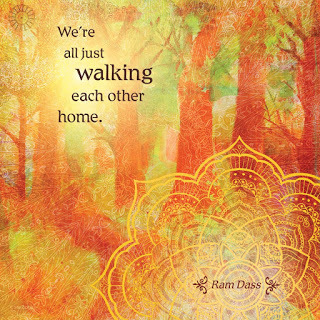
If you'd like to contribute to the relief fund for the 6,432 families who lost their homes in a single day, you can join me in contributing to NorCal United Way <-----by clicking on that link, or texting BUTTERFIRE to 91999. All proceeds from sales of any of my books during the month of November will be donated to victims of the #CampFire in Butte County.
Published on November 10, 2018 10:08
October 22, 2018
Reteaching A Thing Its Loveliness
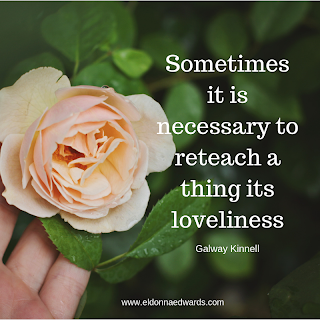 "The bud stands for all things, even for those things that don't flower; for everything flowers, from within, of self-blessing..." Galway Kinnell,
Saint Francis and The Sow
"The bud stands for all things, even for those things that don't flower; for everything flowers, from within, of self-blessing..." Galway Kinnell,
Saint Francis and The Sow
Over the last several weeks I've stayed at various hotels, traveling partly for work and partly for pleasure (although I'm very fortunate to take great pleasure in my work). I love the adventure, but being on the road comes with a plethora of pitfalls, from planning, to packing, to traffic jams to searching for healthy food, to finding accommodations that are clean and comfortable without blowing my travel budget.
One of my secrets to happy travels is to always bring my own down-filled pillow from home to guarantee a good night's sleep. As of last week, I shall now add hand-mirror to the list of must-brings because there is a malevolent presence lurking in every hotel bathroom. It lays flat against the tile with an elbow that scissors outward so you can check the bed-head cowlick on the back of your scalp. That's the happy, friendly side. Flip it over and you will come face-to-face, literally, with a magnified image of every pore, every wrinkle, every age spot on your skin. And if you are over fifty, you will die inside, just a little, at the realization that the face you knew or thought you knew has taken leave. Step back a little and you might find that it took your svelte, toned premenopausal body with her.
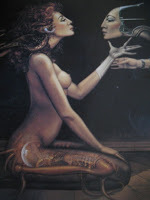
As someone who embraces diversity whether it be sexual preference/gender ID, ethnicity, religion, politics or physical differences, why is it so hard to turn that acceptance inward? Why do I immediately focus on perceived flaws in my physical body? Am I in denial of the aging process or does it go deeper to that imperfect perfectionism that has plagued me for most of my life? As if on cue my beloved shared this poem with me as he sipped his morning tea, merely because it spoke to him. That's the thing about poetry; it fillets a concept and leaves you these beautiful, honest bones to pick between the crevices of one's reality. He took his meaning and I took mine, vowing to be less critical of myself in thoughts and words.
Along with traveling, I've been working against a looming deadline on the final revisions of Clover Blue. As most writers will admit, we can go from "This is amazing!" to "This sucks!" in a matter of seconds while writing and revising our stories. But this time, as I did my final read, I decided to put away the magnifying lens of perceived imperfection and, as Galway Kinnel wrote, remind it of the long perfect loveliness of itself. And it's true. I love this book and I love the characters and I hope you will, too. In the meantime, may we all remember that everything flowers from self-blessing. Except maybe that fucking magnifying mirror. That thing is pure evil.
What about you? Tell me something lovely about yourself, right here, right now.
*******************Pssst! We're still seven months away from publication, but I hope you'll add CLOVER BLUE to your Want-To-Read-List on Goodreads and follow my Facebook Author Page to be notified of giveaways and the Cover Release Party. You can also Pre-Order it HERE.
Eldonna Edwards grew up in a large family nestled between cornfields and churches in the provincial Midwest. She eventually escaped the harsh winters, moving to California where she expanded her career from journaling facilitator to author to beloved writing instructor to keynote speaker. Her bestselling debut novel, This I Know, won over the hearts and minds of readers everywhere and was a Delilah Book Club selection. In her second novel Clover Blue (May 2019) Eldonna once again explores themes of otherness and belonging, and the true definition of home. She is also the subject of the award-winning documentary Perfect Strangers that follows one kidney patient and one potential kidney donor in their search for a possible match. Her 2014 memoir Lost in Transplantation chronicles this life-changing decision. Eldonna currently lives and writes in a tiny pink house with her best friend, Brer.
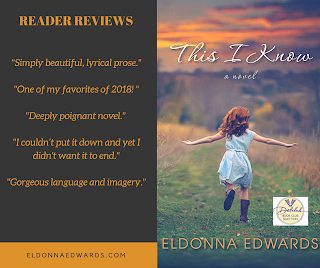
Published on October 22, 2018 08:00
September 4, 2018
Empty Nest, Full Heart
[image error]
I was just sixteen years old when I left my parents' home to marry a boy the next town over. I'm quite certain some people assumed it was because I "had to" get married. But I wasn't pregnant, I was merely foolish. And stubborn. Really, really stubborn. I actually believed that by moving away, I'd show my mom and dad just how much they'd miss their petulant, free-spirited daughter. Ha!
Looking back, I can only imagine the private happy dance they shared when I was out of their hair. Sure they'd miss me. They loved me. But man did I make their life difficult. I skipped school. I smoked pot. I went to parties. I played hooky from church. I pretty much did the opposite of everything they demanded of me. Not because I didn't love them--I did--but because I thought I knew better than them.
My emancipation came with a price. Suddenly I was in charge of me. I had to figure out how to pay bills which meant getting a job while also finishing high school. I learned how to balance a checkbook, shop for the best deals on groceries, cook meals and run a household. I even learned to change my own oil and spark plugs. At first it was fun, this perpetual date with my high school sweetheart and being addressed as "Mrs." by my teachers. Then one year later I did end up pregnant and gave birth just weeks before my high school graduation. Suddenly it was no longer just me playing house; I was now responsible for another life.
In THIS I KNOW my young protagonist's mother suffers from postpartum depression. There's a very intimate scene between mother and daughter, when Grace sees her mama for the first time as Isabelle Carter the woman with hopes and dreams instead of the person who sews her dresses, cooks her meals and combs the tangles out of her hair.
Mama stands and walks across the porch to look out over the meadow. She’s barefoot and wearing a sleeveless sundress with tiny yellow flowers on it that I’ve never seen before. It doesn’t have any pockets. All of Mama’s clothes have pockets. Most of the time they’re full. She turns around and leans back against the railing. Mama looks radiant in spite of the topic of our conversation. I can’t remember seeing her this happy. Ever. Which worries me.
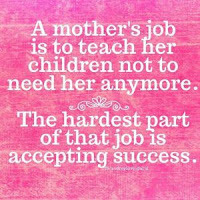 I chose to symbolize the 1960s mother archetype as the family custodian, cleaning behind and picking up after her husband and five children. In this particular scene, Mama escapes reality by envisioning her dream house with a porch swing that overlooks a flowered meadow. She liberates herself from her expected role by wearing a sundress without any pockets. The dress says I'm free and unburdened. Of course, this scares the daylights out of Grace, who tries to convince her mother that she is loved, but what she's really saying is that she's needed.
I chose to symbolize the 1960s mother archetype as the family custodian, cleaning behind and picking up after her husband and five children. In this particular scene, Mama escapes reality by envisioning her dream house with a porch swing that overlooks a flowered meadow. She liberates herself from her expected role by wearing a sundress without any pockets. The dress says I'm free and unburdened. Of course, this scares the daylights out of Grace, who tries to convince her mother that she is loved, but what she's really saying is that she's needed.
I remember very clearly the day my youngest son left for college. I cried all the way home. I'd finally gotten that longed-for emancipation and it sucked. Although I cherish my idyllic, child-free adult life, I still miss being needed to tie a shoe, to kiss a hurt, or to comfort a heartbroken teen. My pockets might be empty of broken crayons and baby spoons, but my heart is so full of the memory of each of their young faces as they toddled toward me, arms outstretched, brimming with unbridled trust.
Parents: What about you? Are you dreading or looking forward to a life without dependents? If your nest is currently empty, are you enjoying your more care-free life? Would you let your adult children move back home to save money on living expenses?
**********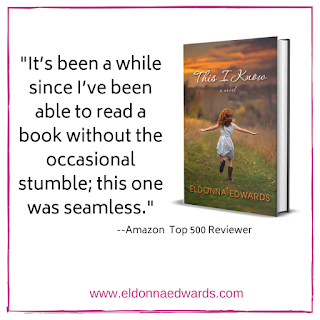
THIS I KNOW by Eldonna Edwards is available at your favorite Independent and Online Bookstores:
B&N Hudson BooksellersAmazon Target BAMIndieBound Walmart
Looking back, I can only imagine the private happy dance they shared when I was out of their hair. Sure they'd miss me. They loved me. But man did I make their life difficult. I skipped school. I smoked pot. I went to parties. I played hooky from church. I pretty much did the opposite of everything they demanded of me. Not because I didn't love them--I did--but because I thought I knew better than them.
My emancipation came with a price. Suddenly I was in charge of me. I had to figure out how to pay bills which meant getting a job while also finishing high school. I learned how to balance a checkbook, shop for the best deals on groceries, cook meals and run a household. I even learned to change my own oil and spark plugs. At first it was fun, this perpetual date with my high school sweetheart and being addressed as "Mrs." by my teachers. Then one year later I did end up pregnant and gave birth just weeks before my high school graduation. Suddenly it was no longer just me playing house; I was now responsible for another life.
In THIS I KNOW my young protagonist's mother suffers from postpartum depression. There's a very intimate scene between mother and daughter, when Grace sees her mama for the first time as Isabelle Carter the woman with hopes and dreams instead of the person who sews her dresses, cooks her meals and combs the tangles out of her hair.
Mama stands and walks across the porch to look out over the meadow. She’s barefoot and wearing a sleeveless sundress with tiny yellow flowers on it that I’ve never seen before. It doesn’t have any pockets. All of Mama’s clothes have pockets. Most of the time they’re full. She turns around and leans back against the railing. Mama looks radiant in spite of the topic of our conversation. I can’t remember seeing her this happy. Ever. Which worries me.
 I chose to symbolize the 1960s mother archetype as the family custodian, cleaning behind and picking up after her husband and five children. In this particular scene, Mama escapes reality by envisioning her dream house with a porch swing that overlooks a flowered meadow. She liberates herself from her expected role by wearing a sundress without any pockets. The dress says I'm free and unburdened. Of course, this scares the daylights out of Grace, who tries to convince her mother that she is loved, but what she's really saying is that she's needed.
I chose to symbolize the 1960s mother archetype as the family custodian, cleaning behind and picking up after her husband and five children. In this particular scene, Mama escapes reality by envisioning her dream house with a porch swing that overlooks a flowered meadow. She liberates herself from her expected role by wearing a sundress without any pockets. The dress says I'm free and unburdened. Of course, this scares the daylights out of Grace, who tries to convince her mother that she is loved, but what she's really saying is that she's needed.I remember very clearly the day my youngest son left for college. I cried all the way home. I'd finally gotten that longed-for emancipation and it sucked. Although I cherish my idyllic, child-free adult life, I still miss being needed to tie a shoe, to kiss a hurt, or to comfort a heartbroken teen. My pockets might be empty of broken crayons and baby spoons, but my heart is so full of the memory of each of their young faces as they toddled toward me, arms outstretched, brimming with unbridled trust.
Parents: What about you? Are you dreading or looking forward to a life without dependents? If your nest is currently empty, are you enjoying your more care-free life? Would you let your adult children move back home to save money on living expenses?
**********

THIS I KNOW by Eldonna Edwards is available at your favorite Independent and Online Bookstores:
B&N Hudson BooksellersAmazon Target BAMIndieBound Walmart
Published on September 04, 2018 10:30
August 13, 2018
What's in A Name? (Why Choosing Character Names isn't As Easy As You Think)
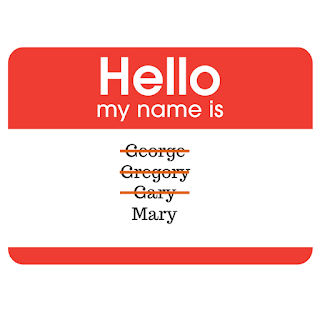 One of my favorite parts of writing is choosing character names. It's also one of the most challenging. Just when I think I've settled on the perfect name I discover (usually through polling friends or from beta readers) that the chosen name doesn't work for them, usually because they have a history with it.
One of my favorite parts of writing is choosing character names. It's also one of the most challenging. Just when I think I've settled on the perfect name I discover (usually through polling friends or from beta readers) that the chosen name doesn't work for them, usually because they have a history with it.Take for example the name Linda. One of my favorite people in the world is named Linda. However at least three of my long-term relationships have been with men who've longingly recounted the torrid, sometimes-unrequited love affair with their Linda. One of my lovers had two special Lindas. All the Lindas in these stories are drop-dead gorgeous, highly intelligent, sexy, hilarious women who've left an indelible mark on these men's version of the ideal women. There's no way I'd not unpack my Linda baggage if I chose it for a character.
In THIS I KNOW, claiming to be inspired by God, Reverend Carter "divines" names for his newborn children.
"Mama told us that after each baby was born Daddy held his fat black Bible over our tiny bodies and the Lord bestowed upon him a name for his children. To tell you the truth, I don’t think Daddy was listening very well. Or maybe God changed His plans, because none of us fit our given names except for maybe Hope, who is the oldest."
I loved choosing the names that Daddy gives his daughters. I knew I wanted him to screw up because it was important to underscore the ego hidden within the act of projecting personalities upon his progeny. Ironically, as a writer, I am the all-
[image error] powerful name god and I got to name the reverend. I sometimes imagined him standing behind me as I wrote. Henry? Really? Pretty sure I'd be a James or a John, good strong names. (Insert author's maniacal laugh.)
In my next book (CLOVER BLUE/June 2019) the characters live in a spiritual commune in 1970s Northern California. Each member chooses a new name for themselves when they join--except for the children, who are named by the guru. The "Olders" pick names like Coyote, Jade, Wave, Willow, Sirona, Gaia, Lotus and Doobie. The children, referred to as "Youngers" are named Harmony, Moon, Aura, Rain and, of course, Clover Blue. You can probably imagine how fun it was to name them, right? Yes, but you wouldn't believe the list of outrageous, often horribly ridiculous hippie-dippy names I waded through before settling on this ragtag cast of characters who live in the woods without plumbing or electricity.
I feel fortunate to have been gifted with a unique name by my mother. Her name was VaLoyce, an uncommon name that rolls off the tongue and sounds exotic. I like to think my mom chose "Eldonna" for me because she believed I was the child who would fully embody such a powerful name. She once told me that she went to high school with an Eldonna and always liked the name, but I call bullshit on that. I think by the time she gave birth to her fifth daughter she ran out of girl names. She probably figured I'd adopt the shortened "Donna" but I never took to it outside our home. I was always Eldonna at school and in the workplace. I also rejected the suggestion from a well-meaning professional to use my nickname Ellie as my author name because "it's more approachable." To my siblings I am Donna. To many of my friends, I'm Ellie. But in my blood and bones, I am Eldonna. Sounds a little melodramatic to say that, but hey, Eldonna is a serious damn name.
What about you? What are your favorite or least-favorite names? Do you like your name? If you could change your name would you? What would you change it to? Have you ever stopped reading a book because you hated the character's name?
*****************This is a non-monetized blog. If you enjoyed this post, I hope you'll share it. If you want to help support an author working on her next book, I hope you'll consider purchasing my books. Thank you!
 THIS I KNOW
THIS I KNOW
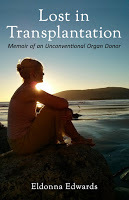 LOST IN TRANSPLANTATION
LOST IN TRANSPLANTATION
Published on August 13, 2018 11:27
June 26, 2018
How Growing Up Poor Made Me A Minimalist
[image error]
Call it lack of awareness or naivete, but as a child I had no idea my family was poor. We had food on the table, clothes on our backs and plenty of love to go around so I never felt lacking. It didn't occur to me to question wearing hand-me-down blouses or homemade dresses that my mother sewed for us. Coming from a large family, I just assumed these to be normal, practical things that most families did.
The fact that I was unaware of our socioeconomic status says more about my upbringing than it says about me. I loved the meals my parents prepared out of leftovers, stretching our Sunday pot roast well into mid-week. I felt lucky to inherit one of my older sisters coveted outfits. And sharing a bed with my younger sibling was much more of a comfort than a burden--save for those times she gouged me with a sharp toenail.
It wasn't until I was much older that I began to understand how challenging it must have been to feed seven children on a rural minister's income. I have faint memories of falling asleep in the back seat of our car when my mom drove thirty miles to pick up my dad from his second-shift job. He worked at a Brunswick factory where he'd sometimes bring home defective bowling pins for us to play with. We loved those wooden pins, painting faces on them and gluing yarn on the top for hair. According to family legend he once brought home bowling shoes for us to wear. I was too young to remember it, but I heard how my older sisters pitched a fit and refused to wear the shoes to school. My dad insisted they were the same as saddle shoes and his ungrateful daughters should be happy to have them. My teen sisters begged to differ and the shoes "went missing" after that.
When drawing the character of Reverend Carter in THIS I KNOW I drew from my own experience of growing up with a man who could squeeze 200 pennies out of a dollar. He accepted gifts of venison from church members and had it ground with pork suet so his kids wouldn't balk at the wild taste. He milked his clergy discount wherever and whenever he could, often embarrassing my mom. And he cut coupons like nobody's business, stuffing his suit pockets, his wallet, and the glove compartment of our Plymouth until the little door wouldn't stay shut.
One of my favorite scenes in THIS I KNOW is when Grace goes grocery shopping with her Daddy:
When our basket is nearly full, Daddy stops in the middle of the aisle and thumbs through his stack of coupons looking for ten cents off Charmin. When he finds it, he pulls three packages off the shelf and dumps them in the cart. He doesn’t squeeze them even a little bit. I glance over the list and draw a line throughTP. Daddy never spells it out. Maybe he worries about dropping the list and somebody finding out Pastor Carter wipes his behind just like everybody else. Which is kind of funny since he spends more time in the bathroom than anyone else I know.
You'd think that growing up having less would make me want more as an adult, but the opposite is true. My dad taught me the value of love over needless things. I live in a 400 square foot granny unit. I drive a 16 year-old car. I shop at thrift stores. I recycle or re-purpose whenever possible. I cut my own hair. And I rarely buy anything I don't need. Unless. Unless I have a coupon. Or it's a really, really good deal. In which case I've been known to blow money on restaurants, spas, concerts and bookstores. Yesterday I bought a new story board at Office Max. I'd been using push-pins to tack my scenes onto a wall but they had white boards for half off retail. I rationalized that the new dry-erase board would make writing the next book easier but the truth is I inherited the thrill of saving a buck from my dad.
I'm not cheap--I tip well and happily pay for quality products and services. But I still love a good bargain. I subscribe to Bookbub, scour the internet for airfare deals and never pay rack rate for a hotel room. Which is why I want to acknowledge that $26 for a hardcover book is a bit steep for some of our budgets. I'm thrilled to share that my publisher is running a sale on THIS I KNOW for 90% off the cover price. My dad was frugal but he was also generous. If he were alive today I bet he'd buy every one of you a copy.
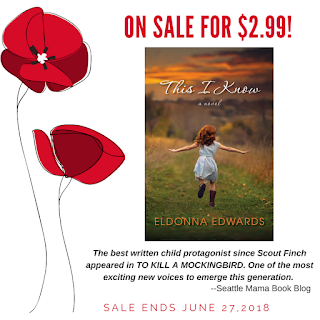
The fact that I was unaware of our socioeconomic status says more about my upbringing than it says about me. I loved the meals my parents prepared out of leftovers, stretching our Sunday pot roast well into mid-week. I felt lucky to inherit one of my older sisters coveted outfits. And sharing a bed with my younger sibling was much more of a comfort than a burden--save for those times she gouged me with a sharp toenail.
It wasn't until I was much older that I began to understand how challenging it must have been to feed seven children on a rural minister's income. I have faint memories of falling asleep in the back seat of our car when my mom drove thirty miles to pick up my dad from his second-shift job. He worked at a Brunswick factory where he'd sometimes bring home defective bowling pins for us to play with. We loved those wooden pins, painting faces on them and gluing yarn on the top for hair. According to family legend he once brought home bowling shoes for us to wear. I was too young to remember it, but I heard how my older sisters pitched a fit and refused to wear the shoes to school. My dad insisted they were the same as saddle shoes and his ungrateful daughters should be happy to have them. My teen sisters begged to differ and the shoes "went missing" after that.
When drawing the character of Reverend Carter in THIS I KNOW I drew from my own experience of growing up with a man who could squeeze 200 pennies out of a dollar. He accepted gifts of venison from church members and had it ground with pork suet so his kids wouldn't balk at the wild taste. He milked his clergy discount wherever and whenever he could, often embarrassing my mom. And he cut coupons like nobody's business, stuffing his suit pockets, his wallet, and the glove compartment of our Plymouth until the little door wouldn't stay shut.
One of my favorite scenes in THIS I KNOW is when Grace goes grocery shopping with her Daddy:
When our basket is nearly full, Daddy stops in the middle of the aisle and thumbs through his stack of coupons looking for ten cents off Charmin. When he finds it, he pulls three packages off the shelf and dumps them in the cart. He doesn’t squeeze them even a little bit. I glance over the list and draw a line through
You'd think that growing up having less would make me want more as an adult, but the opposite is true. My dad taught me the value of love over needless things. I live in a 400 square foot granny unit. I drive a 16 year-old car. I shop at thrift stores. I recycle or re-purpose whenever possible. I cut my own hair. And I rarely buy anything I don't need. Unless. Unless I have a coupon. Or it's a really, really good deal. In which case I've been known to blow money on restaurants, spas, concerts and bookstores. Yesterday I bought a new story board at Office Max. I'd been using push-pins to tack my scenes onto a wall but they had white boards for half off retail. I rationalized that the new dry-erase board would make writing the next book easier but the truth is I inherited the thrill of saving a buck from my dad.
I'm not cheap--I tip well and happily pay for quality products and services. But I still love a good bargain. I subscribe to Bookbub, scour the internet for airfare deals and never pay rack rate for a hotel room. Which is why I want to acknowledge that $26 for a hardcover book is a bit steep for some of our budgets. I'm thrilled to share that my publisher is running a sale on THIS I KNOW for 90% off the cover price. My dad was frugal but he was also generous. If he were alive today I bet he'd buy every one of you a copy.

Published on June 26, 2018 10:40
June 14, 2018
Faith of Our Fathers
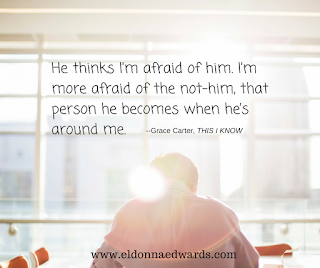 "Faith of our fathers, we will love. Both friend and foe in all our strife." --Frederic William Faber, Catholic Hymn 1849
"Faith of our fathers, we will love. Both friend and foe in all our strife." --Frederic William Faber, Catholic Hymn 1849When I was a little girl I thought my father was infallible. He was, after all, the minister of our church and shepherd to more than one flock of parishioners. He was firm but kind. Strict but never mean. Compassionate but not a pushover. Well, usually not a pushover.
People often ask me if Rev. Carter in THIS I KNOW is based upon my real-life dad. The answer is complicated. My dad was a rural preacher so of course I had lots of personal experience a lot to draw on when creating the character of Henry Carter. For example, I stole some of my dad's quirky habits like studying in the (only!) bathroom and using toilet paper as a bookmark for his Bible when one of his seven kids knocked on the door. And like Rev. Carter, my dad was eager to hand out religious tracts to anyone within reach of his fully-stocked pocket and use grocery coupons stored in the other one. But that's pretty much where Pastor Edwards leaves off and Rev. Carter begins.
One of my main goals in writing THIS I KNOW was to juxtapose a minister's devotion to his
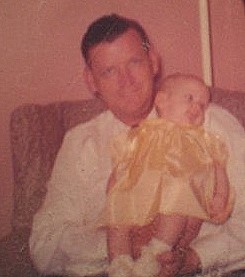 belief system against a father's love for his child. Would he feel forced to choose one over the other? Or would he expand to encompass a belief that embraces the unknowable? Added to these questions was the increased challenge of a time period when children were expected to be seen but not heard. This concept felt like a perfect storm between righteousness and choosing what is morally right.
belief system against a father's love for his child. Would he feel forced to choose one over the other? Or would he expand to encompass a belief that embraces the unknowable? Added to these questions was the increased challenge of a time period when children were expected to be seen but not heard. This concept felt like a perfect storm between righteousness and choosing what is morally right.One of my favorite passages from THIS I KNOW demonstrates the dichotomy of a "man of God" struggling against his human ego.
Esther inhales sharply, startling Daddy and he drops his Bible. Everyone gasps because it’s a sacrilege to let the Word of God touch the floor, even worse than the American flag. When Daddy leans over to pick up his Bible, ink pens and tracts fall out of his shirt pocket, making even more of a mess. Several of the ladies stoop down to help him, like a flock of teacher’s pets clamoring for an A+. His face reddens from embarrassment or anger, I’m not sure which. Probably both.
My dad passed away 17 years ago at the age of 89. Today would have been his birthday. As Father's Day approaches, I can't help but wonder how he would respond to my book. As a man who had strong opinions about the afterlife I suppose he might take issue with young Grace communicating with her deceased twin. But I expect that as my dad, he'd be darn proud of me for writing a novel that seems to have struck a chord with readers from all walks of life. This, I know.
*********
[image error]
Have you heard? THIS I KNOW is Delilah Book Club Selection for June from America's most listened-to female radio host! Pop over to her page to read more of Delilah's discussion of why she chose to recommend my book to her 8 million listeners!
Published on June 14, 2018 12:22



